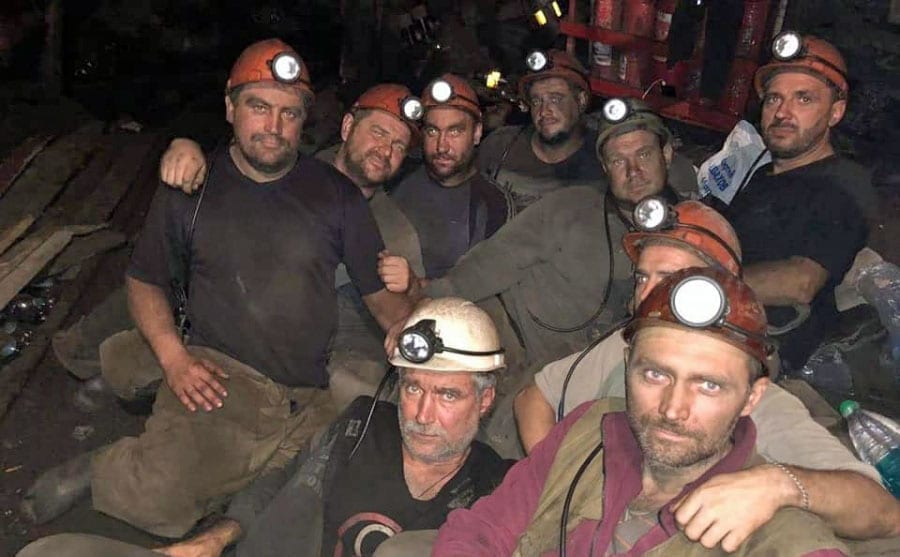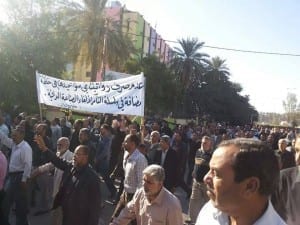
Nov 2, 2018
Coal miners in Ukraine have protested underground over the past 15 days to demand months of unpaid wages after 33 miners at the state-owned Lysychansk coal mines refused to leave from their underground shift. The miners are demanding wages they did not receive from June to September 2018, as well as for several months from 2015 to 2017.

KVPU Chairperson Mykhailo Volynets (second from left) visited with coal miners waging an underground protest. Credit: KVPU
While the Ukraine government promised to transfer some of the $10.6 million owed to these miners, Mykhailo Volynets, chairperson of the Independent Trade Union of Miners of Ukraine (NPGU), said even if this promise is honored, some workers may not be paid. Cleaners and boiler house workers are among those who will not receive any of the funds, although they have also not been paid for four months.
Members of the NPGU held solidarity rallies at several locations in Ukraine’s Lviv and Donetsk mining regions. Across Ukraine, workers at state-owned coal mining enterprises are owed roughly $28.5 million in unpaid wages, and this month the figure will reach $42.6 million as October wage payments are due.
Volynets, a former mine worker, visited the men in the mine this week and said he is “deeply concerned about their health and lives. “These miners show genuine courage and integrity during their struggle for justice and fair payment,” Volynets says.
“The air atmosphere and air humidity in mine are also a point of concern. The miners are in dangerous conditions at a depth of 600 meters (1,968 feet). These people work in such extremely difficult and dangerous conditions, and their wages aren’t high.”
In Ukraine, a skilled miner may be paid as little as $280 to $320 a month. Ukraine has the lowest wages in Europe.
Ukraine miners have received international support with the global union IndustriALL sending miners a solidarity letter and calling on the Ukraine government to immediately pay all wages in arrears.

Feb 5, 2018
Hundreds of women in western Zimbabwe who have waged a week-long sit-in at Hwange Colliery Co. Ltd. (HCCL), demanding unpaid wages for their husbands who labor in the company’s coal mines, say they are set to march to tourist-packed Victoria Falls. There, says the women’s spokesperson, Thokozile Ncube, “we will tell the world everything about the company and how our government has failed us.”
Carrying placards reading, “Five years no pay, but going to work everyday,” and “Enough is enough,” the women say they are not satisfied with the response of a former government minister who spoke with them Friday and said he would take their concerns to the president. The women vowed that if their husbands do not receive the wages owed since 2014 by February 15, they will march to Victoria Falls, some 62 miles to the north.
They also demand the resignation of the company’s CEO, who they say has not fulfilled a 2016 High Court order compelling management to pay workers’ back wages.
The women launched their action January 29 with a peaceful rally and have remained at the company’s headquarters, despite heavy rains. Last week, the National Mineworkers Union of Zimbabwe (NMWUZ) provided a tent to shelter the women.
Several thousand miners work in open-pit mines extracting millions of pounds of coal each month for use by power stations and in iron and steel smelting. Most of the workers live in houses in the mining village.
According to news reports, HCCL has been paying miners 50 percent of their salaries since the beginning of 2016 and last June, the company paid 7 percent of the employees’ 2014 outstanding wages.
Nov 17, 2014

Carrying signs protesting unpaid wages, Iraqi textile workers were among workers from several industries demanding back pay. Credit: Ali Rakeb
The Iraqi government’s offer of partial payment to workers in several industries who have not received salaries for months “is unjust” and should be amended to include all unpaid back pay, says the General Federation of Iraq Trade Unions (GFITU).
The Iraq Council of Ministers last week announced it would pay one month’s wages to workers at plants and factories affiliated with the Ministry of Industry. The companies, which are required to generate sufficient operating revenue to pay 40 percent of workers’ salaries, have repeatedly been unable to do so, and the Ministry of Industry has previously paid workers’ salaries when the companies run out of funds.
The Council of Ministers took the action after thousands of workers in Iraq’s leather, textile and vegetable oil industries protested unpaid wages this month in a series of rallies, most recently in Babylon, where hundreds of workers packed the streets leading to the factory.
Ala’a Sabri, general manager of the association of textile industries in Babylon, said, “the protestors stopped work because they have not been paid since August.”
When vegetable cooking oil company workers in Missan, who also have not been paid since August, took to the streets, they were backed by local government officials who asked the government to pay the workers and renovate Missan’s cooking oil factory, which employs 630 workers.
Clothing company employees in Najaf, who produce men’s suits, pants, jackets, gown’s (dishdasha) and military uniforms, and textile workers in Diwanyya and at the Kut textile factory, also rallied for unpaid wages.
“We are protesting today to request the officials resolve these issues,” Hayder Abdul Amir, one of the protesting employees at Kut, told Al Mada press. “We will continue until they comply with our demands.”
Earlier this month, leather workers, who have not been paid for two months, marched in a large demonstration at two leather companies in Karradha, in central Baghdad. The rally followed one in September, when leather workers protested unpaid wages from July and August.
In an action in support of workers, GFITU members rallied at the Ministry of Interior to demand the government formulate clear policies that guarantee the rights of workers in Iraq’s industrial sector by ensuring workers are paid on time. GFITU also called on the government to take steps to address ongoing factory closures that have put many workers out of a job.
GFITU presented a memo addressed to the Prime Minister Hayder Al Abadi that states: “A large percentage of Iraq’s population, represented by 350,000 employees of the Ministry of Interior and their families, are suffering from hardship and serious neglect.”
The memo listed several demands, including timely wage payment; government transparency when awarding textile and other industry contracts; and creation of a joint government council to address obstacles companies face in staying solvent.




